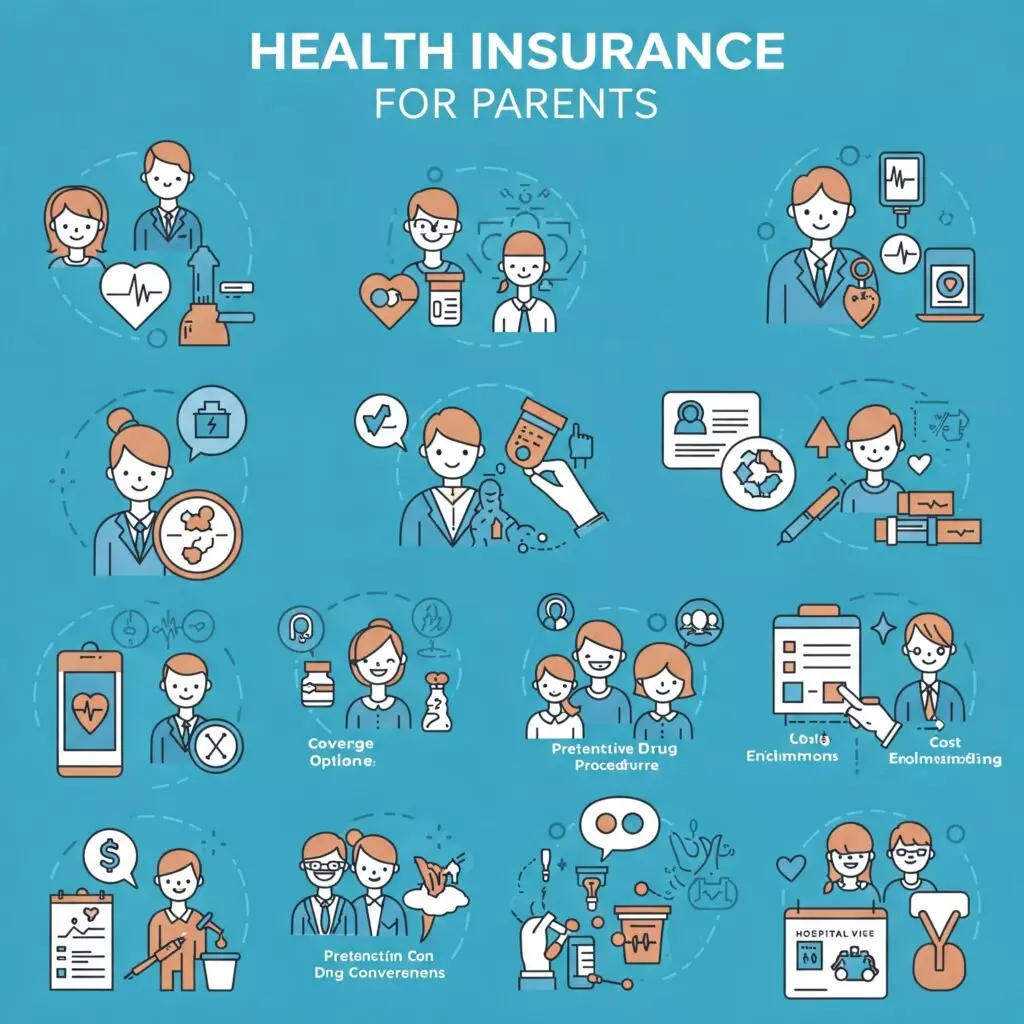Health Insurance For Parents
Background Covering parents with health insurance prevents family savings from being spent on medical expenses and ensures that they can receive treatment for prior illnesses once waiting periods are over, if necessary.
The parameters differ by state, but generally include living with your parents, or formally being classified as a dependent on their tax returns. Some states provide a longer duration of coverage for young adults.
Age requirements
Age is a factor in health insurance choices. People 65 and older may be eligible for Medicare, while people younger than 65 may qualify for Medicaid based on income. In some cases, even they don’t know the cost of their family coverage—both employer plans and private individual policies offer coverage, but not all options for families are affordable.
Young adults under 26 also benefit from the Affordable Care Act (ACA) provision allowing them to stay on their parents’ health insurance until age 26. This enables them to sidestep the expensive expenses related to an individual policy while still obtaining quality healthcare—and could prevent losing any coverage entirely if their job unexpectedly disappears.

This requirement applies to all health insurance plans purchased in the marketplace, including those purchased through an exchange. Parents can choose to maintain coverage of their children until the age of 26; if they choose to do so and there are no epiphanies that make the “adult child” become a reasonable adult without financial hardship, they’ll need to inform their parent within 60 days of opting out before they hit that upper limit, and their parents must offer COBRA coverage of up to 36 months.
The provision of the Affordable Care Act allowing parents to keep their children on their health plans as young adults has dramatically expanded health coverage among Americans. In September 2015, HHS reported that nearly 5.5 million young adults remained on their parents’ insurance plan; whether this coverage actually improved health outcomes is unknown.
Each case will have specifics which can make staying on their parent’s health insurance the right choice. That might be the case, for example, if an illness or injury develops for which they need more complete and expensive coverage than someone who is healthy. In addition, any plan needs to address medical bills due to emergencies.
Most importantly, let’s remember that the ACA provision that allows young adults to remain on their parents’ coverage does not jeopardize their Medicare eligibility. People under age 65 can qualify for Part A coverage (hospital stays) at no cost if they’ve paid into Medicare taxes for 10 years, and they can buy Part B coverage (doctor visits and preventive services) for a premium if they have end-stage renal disease or receive Social Security disability payments.
Medicaid or Medicare Eligible
Before the Affordable Care Act went into effect, most states offered Medicaid to children and adults living on low incomes. But unfortunately, programs varied widely from state to state. Its implementation brought federal assistance based on income and family size requirements for eligibility; people apply through either their state department of social services or local department of health to join the Medicaid program.
It has become an indispensable part of life: health insurance coverage. Without it, people and families could go bankrupt if they find themselves needing to visit a doctor or emergency room because of a medical condition. For healthcare coverage, most have depended on their employer-sponsored plans like Medicare or regionally private health plans.
Most mediclaim policies have an initial waiting period, within which no preexisting conditions are covered by the insurance company, so it becomes important to choose a plan with flexible coverage options and the least possible initial waiting period along with 24/7 available customer support for the best performance.
Certain private health insurance plans offer unique coverage for aging parents. This coverage can be included in existing plans or added on. Although more expensive than some, such offers might provide improved coverage for specific conditions and can provide additional layers of protection for all family members.
Thanks to the Affordable Care Act (ACA), eligible young adult children can remain on their parent’s plan until age 26. That meant that the choice was up to the insurers, but unfortunately not all health insurers provide this benefit, so those looking to take advantage of it should alert their insurer or plan administrator before reaching 26 if they want coverage.
For the incarcerated, if not currently enrolled in Medicare Part B or premium Part A, the Special Enrollment Period (SEP) starts when they leave prison and continues for six months; benefits would be effective the first of the following month if they chose to enroll within that time.
Enrolling in a family plan
When you plan to enroll your parents in a health insurance, you need to understand its process and important terms. You’ll need to know how the plan works—which doctors are in-network, plan costs, enough coverage for your parent’s needs, validity, and renewal.
Most parent plans allow children to stay on the plan until age 26, so young adults can gain work experience and save money while remaining on the parent’s plan. But adhering to the plan isn’t always the maximum ideal decision; for instance, if your parents need professional medical attention, they can impress more by really getting their personal well-being insurance policy, which can be quite a bit cheaper than paying your children for the insurance policy, which has its own regular professional medical benefits features.
You can add your parents to a health insurance plan at any time during the year, depending on what your employer or insurer allows. This differs based on the type of dependent, which some policies state you must claim when you file your taxes. You should also pay close attention to how coordination of benefits works; each plan settles its claims according to its own rules.
Having parents on your health insurance plan can relieve the burden of unexpected medical bills and avoid financial hardships, access quality healthcare services at lower cost, and protect them against lifestyle diseases like diabetes and heart disease.
Investing in long-term health insurance policies for your parents is never a bad idea; in fact, such policies will protect them against any unforeseen expenses in the future, and Chris can avail himself of high-quality healthcare facilities without facing any economic instability at a later stage in life.
Adding parents to your plan
At some point in your life, you may need to add your parents as a beneficiary on your health insurance policy, but you should carefully consider your research and implications to ensure that it is the right choice for you and your family. In addition, each company may have different requirements for adding an insured to a policy, so check with HR first.
Because most private health insurance plans do not cover adult dependents, you can typically include your parents on your policy only if you meet certain criteria, including claiming your parents on tax returns and providing at least half of their financial support. There are exceptions like California, where parents can be added if they live in the service area and are not enrolled in Medicare or government assistance, like food stamps—although again, this option may (not) be limited at a company-sponsored plan—most plans do not allow this inclusion.
Another affordable solution to your parents’ health coverage, buy Medicare Part B, which pays for health benefits such as inpatient hospital stays, doctor visits and preventive services; medically necessary transportation; durable medical equipment (walkers/wheelchairs) as well as some transportation benefits. This plan, unfortunately, doesn’t cover prescription drugs or long-term care benefits.
Upon a life-changing event, say a job change or a marriage, it’s important that you respond to your insurance carrier in a timely manner to have them adjust your plan accordingly. Note that it could take longer if all required forms or documents are not submitted on time.
While it would be great if your parents could be included on your health insurance plan, it is rarely practical or possible in most cases. It’s certainly easier for you to just add him on, and for people who will qualify for the lower cost plans, that is a fantastic option, but it may make more sense for them to go on medicare instead — as long as they don’t any other options.




